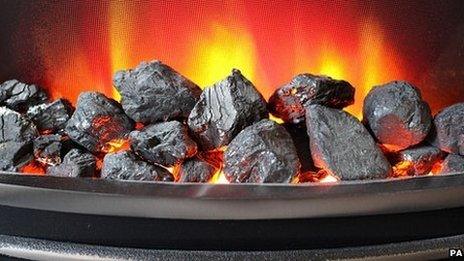Energy bills, and loose change
- Published

Centrica and npower are the latest firms to hike gas and electricity prices
Predictably, energy utilities put prices up more than they haul them down.
Consumers complain bitterly. Politicians side with consumers.
Meetings, with explanations, are demanded.
Utility bosses fume, some less privately than others, that they shouldn't get the finger of blame.
On Friday it was the turn of Centrica (British Gas and Scottish Gas) and npower, hiking both gas and electricity prices.
But it was SSE that took the lead on this round. It did so with a blunt public assessment by its chief executive, Ian Marchant, who stuck it to the politicians and regulators for their role in rising bills.
I wrote about it in August when the Perth-based company announced its prices were on the way up again.
Not only were wholesale prices rising, but so is the cost of subsidising vulnerable customers, providing energy efficiency and reduction measures, moving generation to more renewable sources, and renewing the gas and electricity grids in a way that gets renewable power to its users.
Unconventional gas
But for all concern that energy prices keep rising, there may be some relief on a distant horizon.
As I reported last week for Newsnight Scotland, the "unconventional gas" boom, much of it from the highly controversial "fracking" of shale rock deep underground, is turning energy markets on their heads.

"Fracking" of shale rock deep underground is turning energy markets on their heads
So far the boom is transforming the US gas industry, and the way Americans use gas. Coal-burning power stations have cut output significantly, while gas-burning has surged ahead, faster than renewables.
For those concerned about carbon emissions, that's half way to a good news story, as gas-burning is less dirty than coal, but it's still a long way short of good for the environment.
And the burners are just about to be ignited under that debate in Britain, as the UK government prepares a new strategy on gas.
Chancellor George Osborne has hinted he wants a new generation of gas-burning stations, partly because he's no enthusiast for wind turbines, but also because ambitions for new nuclear are being undermined by cost and uncertainty.
Liquid and natural
As gas prices are regionalised around the world, the sharp cut in US gas prices has not been seen in Europe or Asia. At times this year, the price gap has been huge.
But there are further announcements suggesting that could change by the end of this decade.
Qatar, which specialises in liquid natural gas, said this week it's investing with Exxon Mobil in a big LNG exporting plant on the Texas coast, aimed at shipping US gas to Asia.
A vast plant is already under construction in Louisiana, with the first shipment expected in 2015.
Japan is already the world's biggest LNG importer, and China, South Korea, Taiwan and India have potential to suck in a lot of the new US export industry. LNG may also come from Australia, Papua New Guinea or several African states.
So if gas becomes a global commodity, as oil is, the cheap supply from the US could drive down prices around the world, and encourage investment in other shale gas basins. That has a knock-on effect on substitute forms of energy.
It's not obviously impacting on the world oil market, yet. But US oil prices are subdued, having lost their long-time link with the Brent crude benchmark.
And coal prices have fallen, with a harsh impact coming close to home, hitting the companies that operate Scottish opencast coal fields.
Epic change
This week, Chatham House - the international affairs think tank in London - published its take on the future of the oil and gas industries.
It concluded that oil firms seem configured for a past era, not the next: "Their public strategies look recycled, not renewed".
"The combination of changes that the industry now faces requires epic rather than incremental responses," it added.

The transport sector has been working hard on more efficient engines while shifting to biofuels
Among those challenges and changes, to oil in particular, are external competition from other technologies.
Foremost among them is in the transport sector, which uses half of the world's oil, but which has been working hard on more efficient engines while shifting to biofuels over the past seven years.
"Businesses outside the oil sector are anticipating more severe policies against carbon fuels and are innovating accordingly," according to Chatham House.
"The result will be to flatten and reverse growth in the use of petroleum in transport in developed countries, and slow its growth in developing countries."
Black and green
That's exactly what governments' policies have been trying to achieve, though it's not clear they've thought through all the consequences.
If Chatham House is right, the energy industry has yet to adjust. Its efforts remain focussed on the drive for new technologies to find new reserves and extract more from them.
Scotland's attitude may have to adjust as well. Relatively expensive oil and gas from deep water may look a less attractive investment under Chatham House's scenario, or even if cheap gas pulls down the price of global oil.
The Holyrood government is also under pressure to adjust to the apparent contradiction highlighted in an interesting report in the Guardian this week, external - a powerhouse of renewable energy, funded, at least in part, by extracting every last drop of oil from beneath its waters.
Oil-rich countries have a responsibility to invest in renewable technologies, said Alex Salmond, as he gathered energy investors in Edinburgh, external.
Not so, say environmental campaigners, who are otherwise generous with their praise for his renewable energy targets: maximising fossil fuel production from under the seabed is "indefensible" for a government that wants to be green.
It's a new battlefront among many now opening up, around the world, determining how much we'll pay to keep warm through future winters.